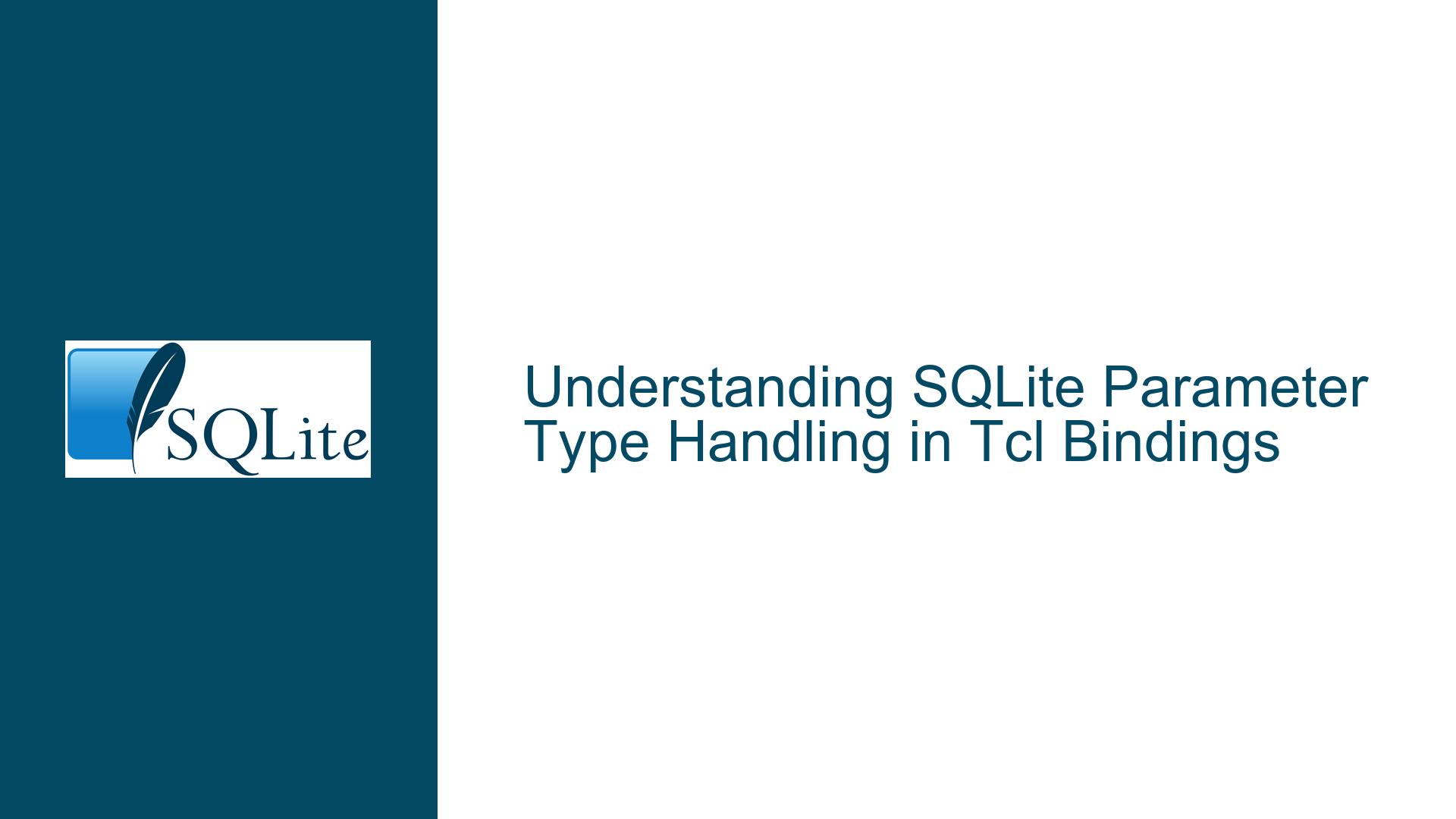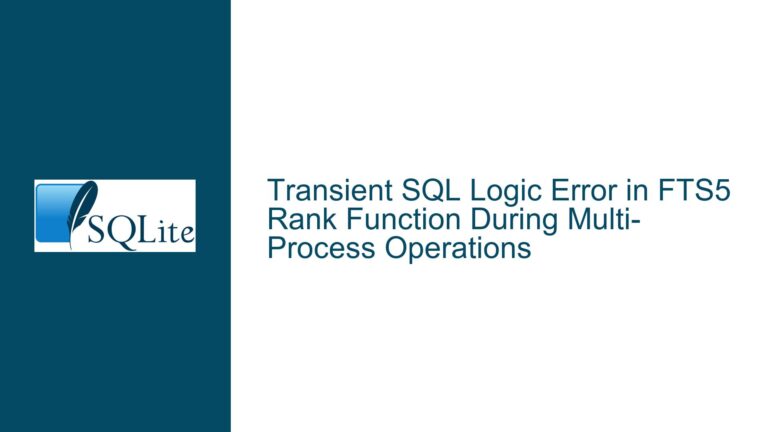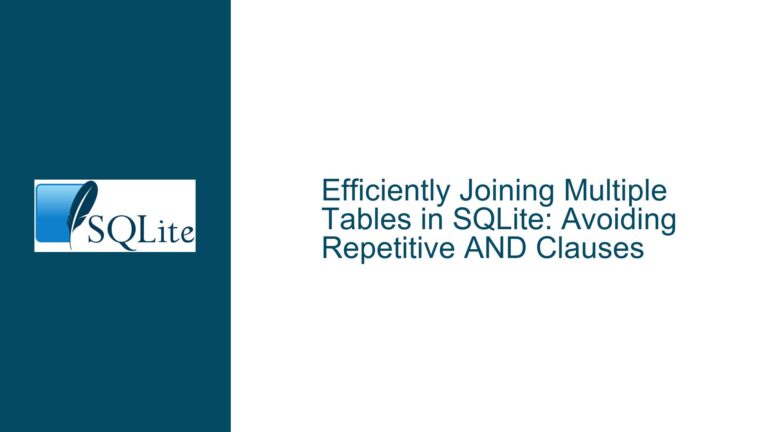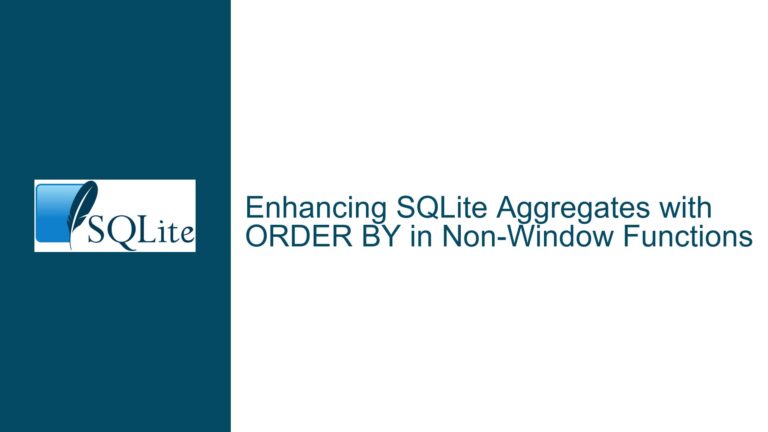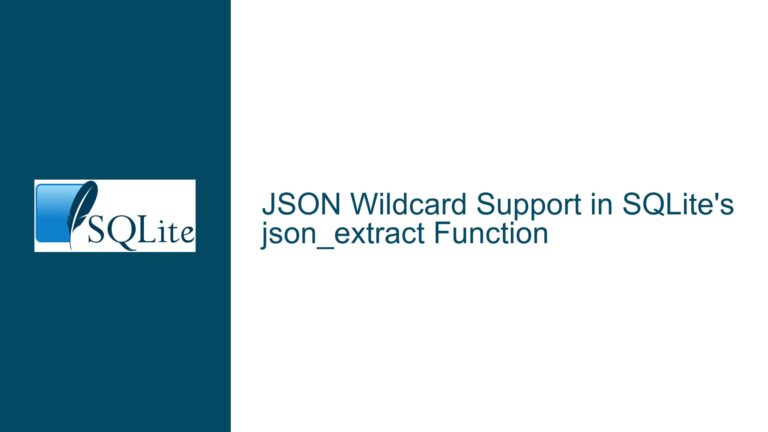SQLite Parameter Type Handling in Tcl Bindings
Issue Overview: Parameter Type Ambiguity in TCL/SQLite Interface
The core challenge revolves around type coercion dynamics when passing Tcl variables to SQLite through parameter binding. While Tcl presents all values as strings at the scripting layer, SQLite’s binding mechanism attempts to infer underlying data types from Tcl’s internal value representations. This creates potential mismatches when numeric comparisons occur in SQL queries, particularly when:
- Tcl variables originate from different construction methods (direct assignment vs arithmetic expressions)
- SQL WHERE clauses perform mathematical operations involving bound parameters
- Recursive CTEs combine multiple value sources with type-sensitive operations
In the specific implementation shown, the :selEnd parameter participates in the critical comparison p.char_len + p.char_bgn <= :selEnd where both operands are expected to be integers. The char_len and char_bgn columns store integer values derived from cumulative sums, making type consistency essential for accurate row filtering. When :selEnd binds as string type despite containing numeric characters, SQLite performs lexicographical comparison rather than numeric evaluation, causing unexpected query results.
The paradox emerges from Tcl’s dual nature: While script variables conceptually exist as strings, the interpreter internally optimizes numeric-looking values by storing their integer representations. SQLite’s binding interface detects these internal representations, creating an implicit type conversion pipeline that bypasses Tcl’s string-only abstraction. This behavior becomes problematic when variables constructed through different code paths (e.g., set selEnd 800 vs set selEnd [expr {799+1}]) acquire different internal type flags despite holding equivalent numeric values.
Possible Causes: Type Inference Conflicts at Binding Layer
Three primary factors contribute to the observed parameter type ambiguity:
1. Tcl’s Dual-Valued Variables
Tcl maintains both string and integer representations for variables containing numeric values. When a variable gets modified through expr or arithmetic operations, Tcl preferentially updates its integer cache. Direct assignment via set preserves the string representation unless the assigned value matches integer syntax. This dual storage causes binding type variance:
set A 500 ;# Stores "500" as string, no integer cache
set B [expr 500] ;# Creates integer cache + string representation
set C "500" ;# Pure string with numeric content
SQLite’s Tcl binding code checks for existing integer caches first, binding them as SQLITE_INTEGER. Pure string variables bind as SQLITE_TEXT even when containing digit characters.
2. SQLite’s Type Affinity Rules in Comparisons
When comparing column values (INTEGER type) against bound parameters, SQLite applies type affinity rules that favor numeric coercion only if the parameter has compatible storage class. A TEXT-bound parameter forces SQLite to attempt string-to-integer conversion of the column values, which succeeds numerically but incurs performance overhead and risks incorrect comparisons when non-numeric strings exist.
3. UNION ALL Type Balancing in Recursive CTEs
The recursive CTE structure combines results from multiple SELECT statements. SQLite enforces type consistency across UNION ALL components by analyzing the first result row’s datatypes. If :selEnd binds as TEXT in later UNION iterations where earlier rows used INTEGER values, type coercion anomalies may cascade through the recursive steps, particularly in the char_bgn accumulation which relies on strict integer arithmetic.
4. Expression-Generated vs Directly Assigned Variables
The original example shows selEnd assigned both via set selEnd 800 and [expr {799+1}]. While these produce equivalent numeric results, their internal Tcl representations differ:
exprreturns a Tcl_Obj with integer cache- Direct assignment creates a pure string Tcl_Obj
This variance explains why[expr {799+1}]makes:selEndbind as INTEGER whileset selEnd 800might bind as TEXT depending on prior use in string contexts.
Troubleshooting Steps, Solutions & Fixes
Step 1: Diagnose Binding Types with Tcl Tracing
Add type introspection to reveal how SQLite perceives bound parameters:
proc bindtrace {method args} {
if {$method eq "bind"} {
lassign $args dbHandle param value
puts "Binding $param as [::tcl::unsupported::representation $value]"
}
}
db trace bindtrace
Execute the query to see internal representations:
Binding :docId as value is a pure string with a refcount of 4
Binding :selEnd as value is a int with a refcount of 3, object pointer at 0x...
Pure string parameters require coercion; those showing "int" will bind as SQLITE_INTEGER.
Step 2: Enforce Numeric Binding Through Tcl Casting
Convert variables to integers before binding using expr or int():
set selEnd [expr {$selEnd}] ;# Forces integer cache
# OR
set selEnd [int($selEnd)] ;# Explicit cast (Tcl 8.5+)
This ensures SQLite receives parameters with active integer caches, bypassing string conversion.
Step 3: SQL-Side Type Enforcement with CAST
Modify the WHERE clause to explicitly cast parameters:
and p.char_len + p.char_bgn <= CAST(:selEnd AS INTEGER)
This overrides SQLite’s type inference, ensuring numeric comparison even if :selEnd binds as TEXT.
Step 4: Standardize Variable Construction
Adopt consistent patterns for variables destined as SQL parameters:
# For integer parameters:
set param [expr { ... }] ;# Guarantees integer cache
# For parameters needing string treatment:
set param [format "%s" $value] ;# Strip numeric caches
Step 5: Utilize Tcl Variable Typing Extensions
Leverage Tcl’s variable command with type constraints (requires Tcl 8.5+):
variable selEnd integer ;# Throws error if non-integer assigned
set selEnd 800 ;# OK
set selEnd "800" ;# Still OK (cast to integer)
set selEnd "abc" ;# Error: expected integer
This adds runtime validation for critical SQL-bound variables.
Step 6: Analyze Query Plan with EXPLAIN
Use EXPLAIN to detect implicit type conversions:
EXPLAIN QUERY PLAN
... original query ...
Look for ApplyAffinity or Cast opcodes indicating SQLite is inserting runtime coercions. Their presence suggests binding type mismatches.
Step 7: Benchmark Type Coercion Impact
Compare query performance with different binding approaches:
# Time both versions
time { db eval $SQL } ;# Original
time { db eval $SQL_CASTED } ;# With CAST(:selEnd AS INTEGER)
If CAST improves speed, it confirms type mismatch overhead in the original.
Final Solution Matrix
| Approach | Pros | Cons |
|---|---|---|
| Tcl-side expr casting | Minimal code change; leverages Tcl optimization | May not propagate through all variable uses |
| SQL CAST operator | Explicit type control; database-centric | Adds query syntax noise; minor perf hit |
| Tcl variable typing | Runtime validation; clear intent | Requires Tcl 8.5+; learning curve |
| Bind trace monitoring | Deep insight into binding process | Debugging overhead; not for production |
Recommended Fix:
Combine Tcl’s expr casting with SQL CAST:
set selEnd [expr {$selEnd}] ;# Ensure integer cache
and p.char_len + p.char_bgn <= CAST(:selEnd AS INTEGER)
This dual approach guards against both Tcl representation drift and SQLite affinity surprises.
Advanced Consideration:
For high-performance systems, precompile SQL statements with db cache size and db prepare to lock in parameter types during preparation. This caches the inferred schema context, making binding types more predictable across repeated executions.
Type Handling Reference Table
| Tcl Construction | Internal Reps | SQLite Binding Class |
|---|---|---|
set x 123 | String only | TEXT |
set x [expr 123] | String + Integer | INTEGER |
set x [format %d 123] | String + Integer | INTEGER |
set x [string trim 123] | String only | TEXT |
set x [int(123.0)] | String + Integer | INTEGER |
This matrix enables precise control over parameter binding behavior by choosing appropriate Tcl variable initialization techniques.
